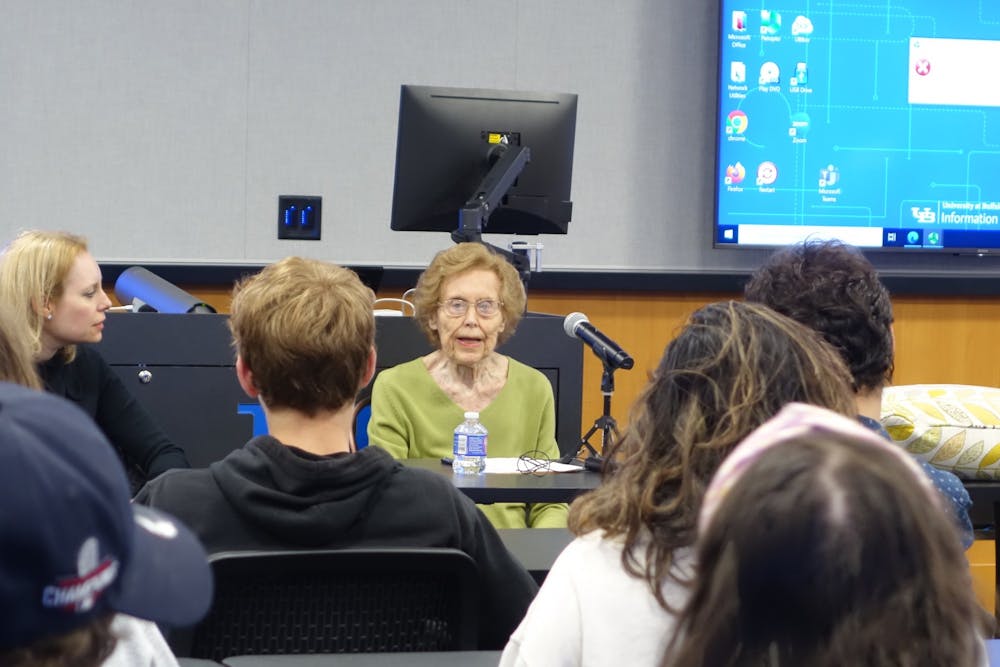Sophia Veffer was 11 years old when Nazi soldiers knocked on her front door. The agents took everything — her father’s business, her family’s furniture and heirlooms, even her piggy bank.
Veffer and her family — and thousands of other Jewish people — thought they would be safe in Amsterdam. Now, with no other options, Veffer’s family entrusted her to strangers and sent her into hiding.
She hid for four years and moved 12 times before the war ended. Others were less lucky: few had the money to go into hiding, and many who did were betrayed by creaking floorboards or suspicious neighbors. Veffer lived just five minutes from Anne Frank, who was only 10 days older than her.
Veffer, now 94, spoke about her years in hiding to a packed room of UB students and Buffalo residents in O’Brian Hall on April 17 at an event hosted by the Jewish Student Union. After working as a special education teacher for 25 years, Veffer now tours area schools to share her story of survival. Her key message: when something is wrong, speak out.
“When the war was over and the gates opened, we thought, ‘The world will see, and will see this can never happen again,’” Veffer said. “But we are still having genocides. That does not mean we should stop talking — we should be talking more.”
Veffer recalls starvation and fear — but perhaps most of all, boredom. With no radio and no access to a library, she read whatever she could find.
“If you had married in a Catholic church, the married couple would always get a Bible from the church. And so wherever I went into hiding, there was a Bible,” Veffer said. “So I read the Bible from page one to page 500 — it was something to read.”
Once, a woman in the resistance brought Veffer to see her grandparents. When she arrived, her 83-year-old grandmother was waiting with a small black bag. The bag was packed with food, “in case they [Nazis] picked her up right there.”
Veffer says the sense of freedom was overwhelming once World War II had ended, but antisemitism still remained. For months afterward, she had no place to live. Her father finally found an apartment in Amsterdam for her to stay at, which he paid for while continuing to search for his own residence.
Nazi Germany’s grip on Europe had ended, but antisemitism hadn’t. The Dutch government refused to return stolen property to Holocaust survivors, and acquaintances whom Jewish families had trusted to safekeep their belongings during the war often kept valuable items for themselves.
Veffer spent her first summer of freedom studying. By the time the school year began in the fall, she had caught up to her grade level. She met her first husband, another Holocaust survivor, and the two tried to establish a life together.
By 1954, Joseph Stalin started jailing Jewish doctors in Russia, convinced they were trying to kill him. Veffer and her husband feared a repeat of the Holocaust and left for the U.S.. The couple first moved to New York City, where her husband secured a job at a Macy’s, before settling in Savannah, Georgia.
Veffer says that while Savannah was one of the most beautiful places she had been, she was shocked by the prejudice and segregation she saw there.
“We were moving books, and a Black woman helped us out,” Veffer said. “We ordered a pizza and sliced it up. She picked up her plate and went to the kitchen — she couldn’t eat around the white people… I had just come [to Savannah] — I was dumbfounded.”
Veffer says she has heard countless stories of prejudice in her years of conversations with students and attendees of her talks. Her goal, taken from the Torah: “Repair the world.”
“Everyone who’s been born should do one good deed in the world,” she said. “If everybody would do that, thousands of years from now, we’d live in paradise. Perhaps two years from now, life will be better.”
The news desk can be reached at news@ubspectrum.com





